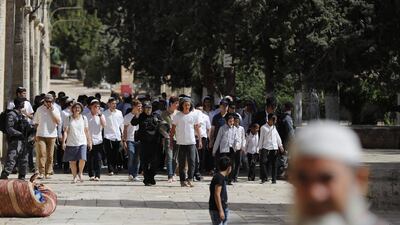Clashes broke out between Palestinians and Israeli police on Sunday after ultra-religious Jews were allowed to visit the Haram Al Sharif compound in Jerusalem’s Old City at the end of Ramadan for the first time in three decades.
The decision to allow them on to the site sparked condemnation from Jordan and the Palestinians, who warned that the decision could spark violence across the region.
Hundreds of Jews were celebrating Jerusalem Day, which marks Israel’s victory in the 1967 Arab-Israeli War and its capture of East Jerusalem, which it then occupied and later annexed in a move not recognised by the international community.
They were led by far-right rabbi Yehuda Glick.
Palestinians threw stones and chairs at police inside the compound, which includes Al Aqsa Mosque, the third-holiest site in Islam.
Jews revere the site but cannot pray there. A Jordanian-Palestinian waqf, or Islamic trust, maintains control of it.
The closest Jews can pray to the site is at the Western Wall, believed to be the remains of a historical Jewish temple.
They are allowed to visit Al Aqsa on occasion during limited hours, but take a different route through the compound. They are banned from showing any religious symbols.
Such a decision, made by Israeli authorities, is rare and Sunday’s tour under the protection of Israeli police was the first in three decades.
Palestinian news agency Wafa said that several Muslim worshippers were injured by Israeli police after they responded to “Jewish fanatics performing a provocative tour of the holy Al Aqsa Mosque”.
It said that “hardcore Jewish organisations” were calling on supporters to organise provocative visits to the compound.
Jordan, the custodian of the compound, slammed the "provocative Israeli policies" after the clashes.
“We unequivocally condemn the continuation of Israeli violations against Al Aqsa, by the break-in of extremists in a defiant manner with the backing of security forces,” the Jordanian Foreign Ministry said.
Senior Palestinian negotiator Saeb Erekat denounced the "attacks by the Israeli occupation authority and its provocations in the Al Aqsa Mosque".
Mr Erekat said the visit was "dragging the region into a new cycle of violence that will threaten the security of the entire region".
The compound is routinely closed to non-Muslims in the last days of Ramadan because of the large number of Muslim worshippers and the potential for conflict between different groups.
Non-Muslims have been let in on Jerusalem Day before but only when it did not fall in the last days of Ramadan.
Israeli security forces were on heightened alert on Sunday because of the controversial visit.
The unrest came before the most sensitive event of the day, when ultra-religious Jews parade through Jerusalem in the afternoon.
The Flag March is protected by Israeli police as local Palestinians usually protest against the provocative rally, in which marchers adorn themselves in Israel’s blue and white flag.
The march intrudes on the Muslim Quarter.
Security forces make Muslim shopkeepers close up for the rally and order residents of the quarter to stay indoors.

